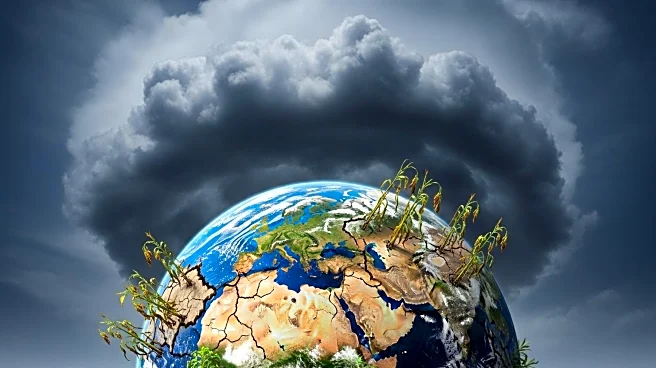What is the story about?
What's Happening?
The federal cabinet of Pakistan has approved a dual emergency declaration focusing on climate and agriculture due to severe monsoon rains and floods affecting the country. Prime Minister Shehbaz Sharif highlighted the extensive damage caused by these unprecedented weather events, which have submerged millions of acres of farmland and displaced thousands of people. The floods have severely impacted key crops such as rice, maize, sugarcane, and cotton, with entire districts in Punjab underwater and floodwaters advancing into Sindh. The cabinet has directed authorities to expedite damage assessments and plans to convene a high-level meeting with provincial leaders to develop a national roadmap to address climate change and mitigate further devastation.
Why It's Important?
The dual emergency declaration underscores the significant challenges Pakistan faces due to climate change and its impact on agriculture, a critical sector for the country's economy. The floods have resulted in substantial agricultural losses, threatening food security and economic stability. The government's response aims to build long-term structural resilience against climate change, which is crucial for preventing future disasters. The situation also highlights the need for international cooperation and support, as Pakistan alone cannot tackle the formidable challenges posed by climate change. The cabinet's decision to allow cheaper RLNG connections is a strategic move to provide relief amid rising fuel costs, potentially benefiting consumers economically.
What's Next?
The formation of a federal response committee led by Planning and Development Minister Ahsan Iqbal is expected to coordinate efforts to address the immediate impacts of the floods and develop strategies for long-term resilience. The upcoming high-level meeting with provincial leaders will be crucial in formulating a comprehensive national plan to combat climate change. Additionally, the cabinet's ratification of a tripartite framework agreement for regional trade expansion indicates a focus on strengthening economic ties and connectivity with neighboring countries. The launch of CPEC Phase II, emphasizing agriculture and investment, is anticipated to boost economic growth and development in Pakistan.
Beyond the Headlines
The dual emergency declaration may have broader implications for Pakistan's international relations, particularly in terms of attracting foreign investment and strengthening strategic partnerships. The government's commitment to enhancing ties with both the United States and China reflects a balanced approach to foreign policy, aiming to leverage international support for economic and infrastructural development. The focus on agriculture and mining sectors in CPEC Phase II could lead to significant advancements in these areas, potentially transforming Pakistan's economic landscape. The situation also raises ethical considerations regarding the global responsibility to support countries facing severe climate challenges.

















